 Petzlover
Petzlover Cretan Hound is originated from Greece but Korean Mastiff is originated from South Korea. Cretan Hound may grow 8 cm / 3 inches shorter than Korean Mastiff. Cretan Hound may weigh 44 kg / 97 pounds lesser than Korean Mastiff. Both Cretan Hound and Korean Mastiff has almost same life span. Both Cretan Hound and Korean Mastiff has almost same litter size. Both Cretan Hound and Korean Mastiff requires Moderate Maintenance.
Cretan Hound is originated from Greece but Korean Mastiff is originated from South Korea. Cretan Hound may grow 8 cm / 3 inches shorter than Korean Mastiff. Cretan Hound may weigh 44 kg / 97 pounds lesser than Korean Mastiff. Both Cretan Hound and Korean Mastiff has almost same life span. Both Cretan Hound and Korean Mastiff has almost same litter size. Both Cretan Hound and Korean Mastiff requires Moderate Maintenance.
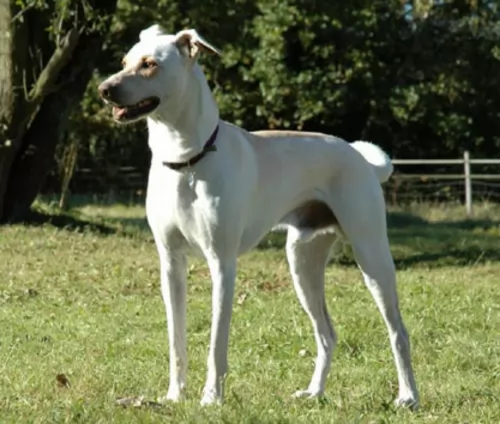 Although the Cretan Hound or the Kritikos Lagonikos is recognized in both Greece and Germany, the hunting dog breed is from the island of Crete, Greece. The dog’s history goes back thousands of years. It is an ancient breed and some believe it is one of the oldest hunting breeds in Europe.
Although the Cretan Hound or the Kritikos Lagonikos is recognized in both Greece and Germany, the hunting dog breed is from the island of Crete, Greece. The dog’s history goes back thousands of years. It is an ancient breed and some believe it is one of the oldest hunting breeds in Europe.
The Cretan Hound has been bred as a working dog, combining sight and scent to track down their prey. Today it is still a rare dog breed that you won’t easily find outside of Crete.
Greece kennels recognize this dog as well as some European kennels, but it isn’t recognized by the American Kennel Club.
 This large breed dog is also known as the Mee Kyun Dosa. In spite of his huge size, he isn’t aggressive at all and is bred to be a companion dog.
This large breed dog is also known as the Mee Kyun Dosa. In spite of his huge size, he isn’t aggressive at all and is bred to be a companion dog.
He was originally developed to be a working dog. The dog was developed in the late 1800’s from European and Asian working breeds. Those interested in dog breeds suspected that a crossing of the Japanese Tosa-Inu with the Neapolitan Mastiff and the Dogue de Bordeaux brought about the breed. They also thought that the Saint Bernard and English Mastiff were brought in later on as well.
These large molosser dogs have been developed through years of inbreeding. It is one of the biggest dogs in Korea.
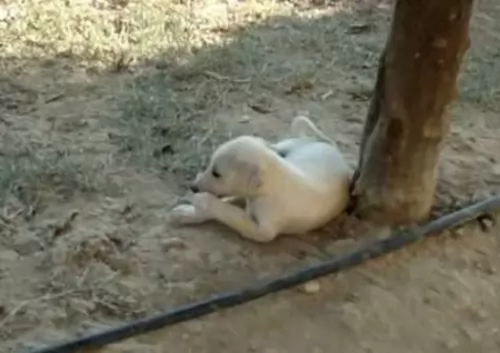 Known for its extraordinary scent abilities as well as its speed, this dog has always been used as a hare hunter because of these skills.
Known for its extraordinary scent abilities as well as its speed, this dog has always been used as a hare hunter because of these skills.
It’s a slender dog of medium to large size and stands at about 60-68cm in height and weighs between 20 – 30kg. It is lean, strong, muscular and swift with a body that is inclined to be longer than tall.
He is slightly heavier than other scenthounds and his ribs aren’t seen. The head is wedge-shaped and the ears drop down, are folded back or can be semi-erect. The eyes are dark and the tail is long and curves upwards with longer hair being found on the tail.
The coat is short and smooth, and coat colors of the dog are varied and can be fawn, sandy, grey, white, black or brindle, and it can be tri-colored too.
The Cretan Hound is alert to sight, sound and scent and when it senses prey, the tail moves in a circular way and the dog becomes rigid for a while before he is off on the hunt.
He is a gentle, intelligent dog, reserved around strangers but making an excellent family pet as he gets on well with all his human family members as well as pets in the house. With good training and socialization, the dog becomes more relaxed around strangers.
He isn’t an aggressive dog, and while he is alert to sounds and smells, he doesn’t make a particularly good watchdog.
 You can’t help but stare at the Korean Mastiff because of his strong, muscular neck of loose skin that forms dewlaps. His face is wrinkled and he has a cumbersome, sluggish gait.
You can’t help but stare at the Korean Mastiff because of his strong, muscular neck of loose skin that forms dewlaps. His face is wrinkled and he has a cumbersome, sluggish gait.
He is a large dog standing at anything between 59 to 76cm in height, both male and female. He can weigh between 65 to 74kg. He is noticeable because of his fairly loose fitting coat, which is short and smooth and which is a rich, shiny reddish, orange or brown colour.
The nose of the dog is broad and dark, the ears soft and floppy and he has eyes which are set wide apart.
The Korean Mastiff is reserved with strangers but he is friendly and even tempered with his human family, making an ideal pet.
He is looked upon as a gentle giant, being an oversized playmate for children and he also tolerates other pets in the home.
He isn't an overly energetic dog, but that doesn't mean he shouldn't be exercised. He will need long walks to avoid him putting on weight.
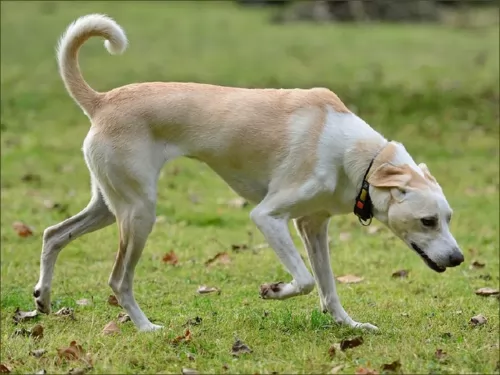 The Cretan Hound is an energetic, curious dog, but when it comes to being a family pet, he is affectionate and gentle.
The Cretan Hound is an energetic, curious dog, but when it comes to being a family pet, he is affectionate and gentle.
He is a reserved dog around strangers. He likes to be busy and will love his walks and games with his human family members. He is smart so is readily trained and he likes to be obedient and to please.
The Cretan Hound will live in harmony with other dogs in the home and they’re also patient and good around disciplined children who have learned to respect animals.
Provide your Cretan Hound with his fair share of love and attention and he will go out of his way to be a loyal and loving family friend.
 Your huge Korean Mastiff is a good natured dog who isn’t aggressive. He loves being with his human family and makes a particularly good pet when he has been trained and socialized.
Your huge Korean Mastiff is a good natured dog who isn’t aggressive. He loves being with his human family and makes a particularly good pet when he has been trained and socialized.
He likes a firm but fair owner who takes a leader-of-the-pack role. In spite of his largeness and sluggishness, he can be quite agile and makes a good watchdog too.
All round, the Korean Mastiff, known as a gentle giant, is capable of making you a splendidly friendly, loving canine companion.
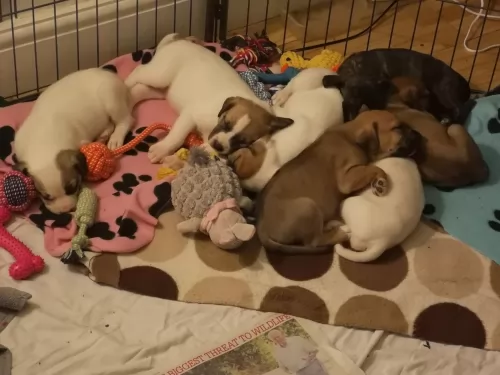 The Cretan Hound is a healthy, robust dog breed, but even so, he can suffer from some common health problems that other dogs are also susceptible to. Some of these are hip dysplasia , cancer, ear infections, bloat and cherry eye.
The Cretan Hound is a healthy, robust dog breed, but even so, he can suffer from some common health problems that other dogs are also susceptible to. Some of these are hip dysplasia , cancer, ear infections, bloat and cherry eye.
Remember that if you don’t want your dog to have puppies, they can actually benefit health-wise from being spayed or neutered. Doing this for your pet can prevent a number of health issues later on down the line.
Make sure too, that your puppy receives his vaccinations in a timely fashion so as to avoid terrible, life threatening illnesses such as parvo and rabies.
 Treat your big Mastiff dog like the wonderful fur-child he is and make sure your attend to all his medical needs to avoid pain and discomfort for him.
Treat your big Mastiff dog like the wonderful fur-child he is and make sure your attend to all his medical needs to avoid pain and discomfort for him.
Cherry eye is a fairly common health issue with this breed. It affects the tear gland of the third eyelid, and if left untreated, can lead to ongoing eye problems.
All dogs have a third eyelid, as well as two tear producing glands to lubricate the eyes. Its an important protective component to eye health in dogs. When the connective tissue that holds the gland in place is damaged or weak, there is a red protrusion of the gland from the lower eye. This is a congenital disorder. Don’t ignore it, but get your pet to the vet so you can catch it early.
Canine bloat, known as gastric dilatation and volvulus can be a killer disease for your pet, more so with deep-chested, large breeds.
Gas accumulation is known as bloat, and its the accumulation of gas which can cause the stomach to rotate. A dog can go into shock from bloat. The reason for this is that the stomach expands, putting pressure on veins. Blood can’t flow as it should and the blood supply gets cut off to the stomach.
Your dog could be vomiting, restless, the stomach hard and bloated or he may be drooling. Dogs who gobble their food down and eat just one large meal a day have an increased susceptibility to GDV than other dogs.
The wrong ingredients of a dog’s diet can also contribute to bloat. High quality food and feeding your pet smaller meals can help.
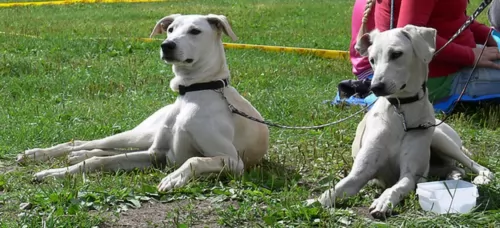 You’re certainly not going to have to do too much grooming with the Cretan Hound as he is a low maintenance breed.
You’re certainly not going to have to do too much grooming with the Cretan Hound as he is a low maintenance breed.
The dog is a short haired breed and an average shedder, so a good brush twice a week will keep the coat free of loose hairs and maintain the condition of the hair.
As with all dogs, the nails as well as the ears must be checked and attended to. The veterinarian can advise you on how to keep his ears clean and free of infection, as prodding around without knowing can damage his ears.
This Cretan Hound has high activity needs. He is energetic and also hard-working, and you’ll need to be taking him on long walks and providing him with some highly energetic playing sessions. Throw ball for him and take him with you when you go jogging or cycling.
 A Korean Mastiff is an easy dog to groom with his short smooth coat. He is a moderate shedder so a brush twice a week will be sufficient to maintain the shiny, smooth condition of his coat.
A Korean Mastiff is an easy dog to groom with his short smooth coat. He is a moderate shedder so a brush twice a week will be sufficient to maintain the shiny, smooth condition of his coat.
Because the dog has lots of skin and folds, these folds will need to be washed and kept clean as grime can collect.
While you're busy attending to his skin check his nails too and check inside and outside his ears for signs of redness and irritation.
Puppies use up more energy than mature adults, requiring a diet of good quality protein. Dogs that have been spayed or neutered will require less calories as will senior dogs.
Korean Mastiffs require high quality nutrition, and if its dry kibble, make sure its the best brand. Mix in some home-made food such as cooked chicken, brown rice and vegetables from time to time as well as some raw meat occasionally.
Protein and fat from good sources are top ingredients for your Korean Mastiff. Avoid food with allergens such as corn and wheat, sweeteners, preservatives and colorants.
Make sure your large pet has constant access to fresh water.